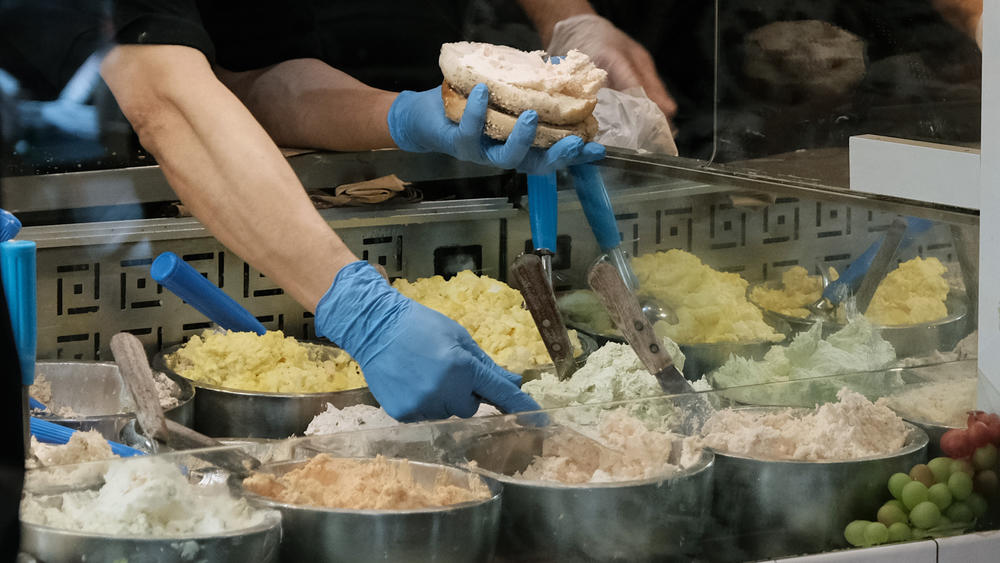Section Branding
Header Content
The Plain Bagel Rule: How naked bread is the ultimate test of a bakery
Primary Content
People really identify with what they eat. Our taste buds can even take on a personality. Seeing strangers on social media eat what we enjoy makes us feel part of a community. We get worked up when others misrepresent or disparage our favorite food. (Look no further than the impassioned foodies behind the evolution of the bagel emoji.)
This societal pressure is why I used to be ashamed about my plain-Jane bagel order. Why — given the exciting, ever-growing array of flavors out there — would my go-to be the plain bagel, the breakfast equivalent of vanilla ice cream? I must have an unrefined palate that has not matured beyond Uncrustables and Goldfish.
So to dismiss any judgments suggesting I might have boring taste buds — and thus less of a personality than Wonder Bread — I have landed on some pretty airtight logic.
The naked bagel is a litmus test for the quality of an establishment. Just as a true chef must prove her technique with a simple omelet, so too can a humble bagel reveal the shortcomings of a baker without the crutch of seasonings.
More and more, variety and flamboyance are crowding out the plain bagel. Sometimes the only options left in the bakery case are poppy seed and sesame seed. There might be an errant rainbow bagel, jalapeño cheddar or maybe a mystery flavor that I'm pretty sure disqualifies the food from being a bagel. If there are plain bagels, there's always the risk that the plains may have gotten too cozy with the everything bagels. Worse, there are those who dare to corrupt the plains by scooping out their chewy insides.
There's no religious, geographical or cultural precedent that explains my bagel preference. I crave a dense carbohydrate as much as the next serotonin-deprived human. But I do not like my bagel to come with distractions. How can anyone appreciate the integrity of the doughy bread ring when tiny kernels of sesame or poppy are competing for attention? It's simply impossible to disguise or enhance a bagel that isn't quality in the first place.
This purist makes the sliced bagel the perfect blank canvas for whatever butter, schmear or cured fish comes next.
In fact, the Plain Bagel Rule applies not only to boiled bread. Sauce on a burger? Don't need it if the patty is too good to mask.
We owe the bastardization of bagels to Connecticut businessman Harry Lender and his sons, who understood the power of branding. To help sell a hole-shaped bread largely maligned as an "ethnic food" and enjoyed by Eastern European immigrants, the Lenders introduced cinnamon raisin, onion and garlic bagels to the masses when they "bagelized" America during the 1970s.
It was Harry's son Murray whose antics in marketing the frozen product eventually made him the face of Lender's Bagels. According to bagel historian Maria Balinska, Murray Lender "stopped at nothing to really publicize their bagels." His publicity stunts included jumping up on his desk and pulling down his pants to reveal "buy Lender bagels'' on his underwear, dyeing bagels green for St. Patrick's Day and serving up an oval-shaped bagel to Oval Office resident Lyndon B. Johnson.
The Lenders' twisted takes were a long way away from the bagels in Krakow, Poland, as described for the first time in 1610. Back then, bagels — believed to be a descendant of the pretzel — were a fixture of Jewish culture, as they are today. But the bagel's center hole was wider and the dough tougher.
There was no need to smother something that was already special to begin with. Hinting at the simple bagel's luxury status, the Jewish elders in Krakow had passed on instructions about the proper time to consume bagels: They were to be eaten as part of the ceremonious rituals of the birth and bris of a baby boy.
With time, America has doubled down on food maximalism with its pollution of perfectly good culinary staples. KFC's reprise of the sodium-laden Double Down perverts the classic fried chicken sandwich. You can now get everything-bagel ice cream. This elaborate fare is undoubtedly stunt food designed to draw buzzy lines out the door and for Instagram likes and TikTok virality. And we reliably gobble it up for the experience, the selfie, the irony, the feeling of belonging — or all of the above. Are our taste buds that bored? Or are we bored with ourselves?
What are you really into? Fill out this form or leave us a voice note at 800-329-4273, and part of your submission may be featured online or on the radio.
Copyright 2023 NPR. To see more, visit https://www.npr.org.


